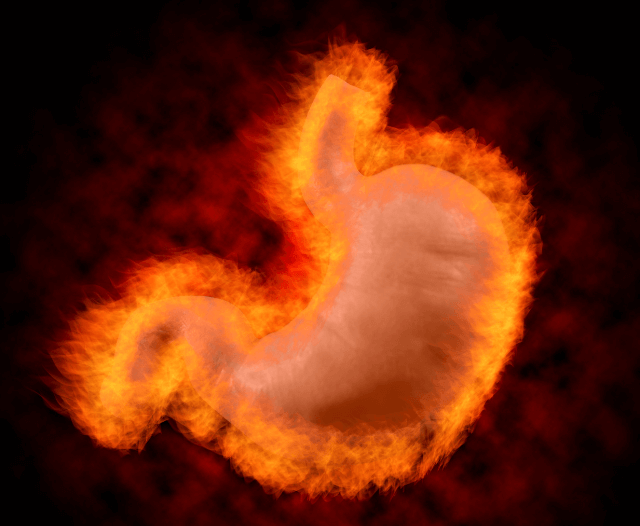Gastrointestinal issues are incredibly common in today’s fast-paced world, and few are as prevalent as acid reflux and gastroesophageal reflux disease (GERD). While many people use these terms interchangeably, they are not the same.
Understanding the difference between occasional acid reflux and chronic GERD is crucial for finding the right treatment and preventing long-term complications.
In this article, we’ll explore the differences between acid reflux and GERD, the causes and symptoms, when to seek medical help, and simple remedies that can ease your discomfort and support better digestive health.
Understanding Acid Reflux
Acid reflux occurs when stomach acid flows backward into the esophagus — the tube that connects your mouth to your stomach.
This happens when the lower esophageal sphincter (LES), a ring-like muscle that acts as a valve between the stomach and esophagus, fails to close properly or opens too frequently.
Common Symptoms of Acid Reflux:
- A burning sensation in the chest (heartburn)
- Sour or bitter taste in the mouth
- Regurgitation of food or liquids
- Difficulty swallowing (dysphagia)
- A feeling of a lump in the throat
- Coughing or hoarseness
Most people experience occasional acid reflux, especially after a large meal, spicy foods, or lying down soon after eating. When acid reflux becomes more frequent — occurring two or more times a week — it may indicate a more serious condition known as GERD.

What Is GERD?
Gastroesophageal Reflux Disease (GERD) is a chronic, more severe form of acid reflux. It is diagnosed when acid reflux occurs regularly and leads to inflammation, damage to the esophageal lining, or more serious symptoms.
GERD is a long-term condition that often requires medical management and lifestyle modifications.
GERD Symptoms:
- Frequent heartburn (more than twice a week)
- Chronic cough or sore throat
- Asthma-like symptoms
- Erosion of tooth enamel from acid
- Sleep disturbances due to reflux
- Chest pain (can mimic heart issues)
GERD can affect people of all ages, and if left untreated, it can lead to complications such as:
- Esophagitis
- Esophageal strictures
- Barrett’s esophagus
- Esophageal cancer

The Difference Between Acid Reflux and GERD
| Acid Reflux | GERD |
| · Occasional episodes | · Chronic and frequent |
| · Usually mild and short-lived | · May lead to long-term complications |
| · Triggered by diet or lifestyle | · Often requires medical treatment |
| · Managed with simple remedies | · May need prescription medication or surgery |
Causes and Risk Factors
While both acid reflux and GERD involve stomach acid flowing into the esophagus, various factors can contribute to their development:
- Diet
- Fatty or fried foods
- Spicy foods
- Chocolate, caffeine, and alcohol
- Citrus fruits and tomatoes
- Carbonated beverages
- Lifestyle Factors
- Overeating or eating too quickly
- Lying down right after meals
- Smoking
- Obesity
- Pregnancy (due to increased abdominal pressure)
- Medical Conditions
- Hiatal hernia
- Delayed stomach emptying
- Connective tissue disorders (e.g., scleroderma)

Diagnosing GERD
If you experience persistent acid reflux or GERD symptoms, consult a gastroenterologist.
They may recommend:
- Upper endoscopy: To examine the esophagus and check for inflammation or damage.
- Esophageal pH monitoring: Measures how often acid enters the esophagus.
- Esophageal manometry: Tests muscle function in the esophagus.
- Barium swallow X-ray: Assesses structure and function of the esophagus and stomach.
Early diagnosis is key to managing GERD and preventing complications.
Simple Remedies for Acid Reflux and GERD
- Dietary Changes
Adjusting your diet is one of the most effective ways to reduce symptoms.
- Eat smaller, more frequent meals.
- Avoid trigger foods (fatty, spicy, acidic).
- Limit alcohol and caffeine.
- Eat slowly and chew food thoroughly.
- Maintain a Healthy Weight
Excess weight increases abdominal pressure, pushing stomach contents upward. Losing even 5-10% of body weight can significantly reduce symptoms. - Avoid Eating Late at Night
Give your body time to digest. Avoid eating 2–3 hours before bedtime to minimize nighttime reflux. - Elevate the Head of Your Bed
Raising the head of your bed by 15–20 cm (6–8 inches) helps prevent acid from traveling back up the esophagus during sleep. - Stop Smoking
Nicotine weakens the LES, allowing stomach acid to escape more easily into the esophagus. - Wear Loose Clothing
Tight clothing can compress the stomach and worsen reflux.

Over-the-Counter and Prescription Treatments
If lifestyle changes aren’t enough, several medications can help:
- Antacids
Neutralize existing stomach acid. Best for occasional heartburn.
- Examples: Gaviscon, Tums, Rennie
- H2 Blockers
Reduce acid production in the stomach.
- Examples: Ranitidine (withdrawn in many markets), Famotidine
- Proton Pump Inhibitors (PPIs)
Strongest acid reducers and first-line treatment for GERD.
- Examples: Omeprazole, Esomeprazole, Pantoprazole
- Prokinetics
Help strengthen the LES and improve stomach emptying.
- Examples: Metoclopramide
Always consult your doctor before starting or stopping any medications.
When Surgery Might Be Needed
For some people with GERD who do not respond to medication or have complications, surgery may be recommended.
Common Surgical Options:
- Nissen fundoplication: The top of the stomach is wrapped around the LES to strengthen it.
- LINX device: A ring of magnetic beads is placed around the LES to keep it closed but allow food to pass.
Surgical intervention is generally considered after thorough evaluation and when other treatments have failed.
When to Seek Medical Help
Don’t ignore persistent symptoms. See your doctor if you experience:
- Frequent or severe heartburn
- Difficulty swallowing
- Unexplained weight loss
- Vomiting or nausea
- Chest pain (especially if it mimics heart symptoms)
These may be signs of more serious conditions like GERD, Barrett’s esophagus, or even early-stage esophageal cancer.
Living with GERD: Long-Term Management
Managing GERD requires long-term commitment. In addition to dietary and lifestyle modifications, regular follow-ups with your gastroenterologist are essential to monitor for complications.
Tips for Long-Term Success:
- Keep a food and symptom diary
- Take medications as prescribed
- Avoid known triggers
- Practice stress management (yoga, meditation, or breathing exercises)
- Get regular checkups, especially if symptoms change

Final Thoughts
While acid reflux is common and often manageable, persistent symptoms may point to GERD, which requires medical attention.
Understanding the difference between the two and taking action early can help you avoid complications and improve your quality of life.
If you’re struggling with ongoing reflux or are unsure whether your symptoms could indicate GERD, don’t wait — speak to your gastroenterologist. With the right care plan, you can regain control of your digestive health and live more comfortably.
Need Help? Contact a Specialist
If you’re experiencing frequent heartburn or digestive discomfort, consult a gastrointestinal specialist for a personalized assessment.
Early treatment can prevent long-term complications and restore your digestive wellness.
Dr. Deetlefs has earned the reputation of a trusted health expert providing consultative, diagnostic, and therapeutic endoscopic and related services to patients in Cape Town and beyond.
Dr. Deetlefs can be contacted to confirm the estimated breakdown should you be interested in having the procedure done.
DISCLAIMER: PLEASE READ CAREFULLY
The information on this website is to provide general guidance. In no way does any of the information provided reflect definitive medical advice and self-diagnoses should not be made based on information obtained online. It is important to consult a Gastroenterologist or medical doctor regarding ANY and ALL symptoms or signs including, but not limited to: abdominal pain, haemorrhoids or anal / rectal bleeding as it may a sign of a serious illness or condition. A thorough consultation and examination should ALWAYS be performed for an accurate diagnosis and treatment plan. Be sure to call a physician or call our office today and schedule a consultation.
© Dr. Eduan Deetlefs, Registered Gastroenterologist, GI Doc Cape Town
Our website information is not intended or implied to be a substitute for professional medical advice, diagnosis or treatment. Please consult a doctor about your specific condition. Only a trained physician can determine an accurate diagnosis and proper treatment.


